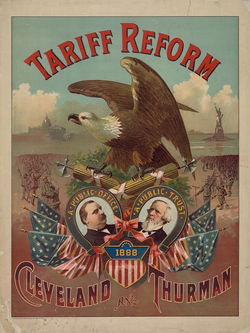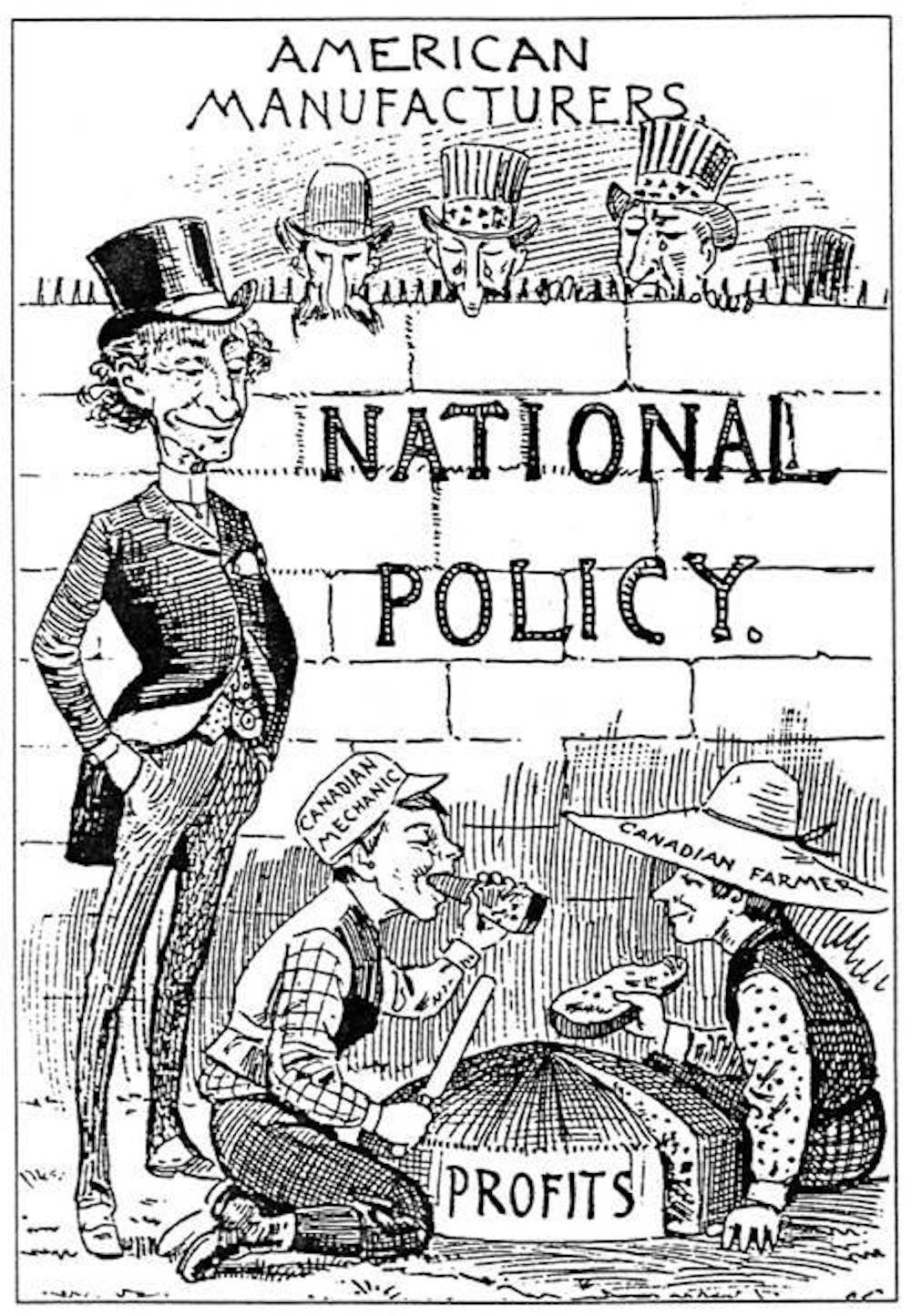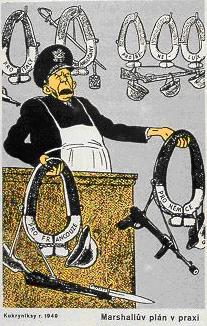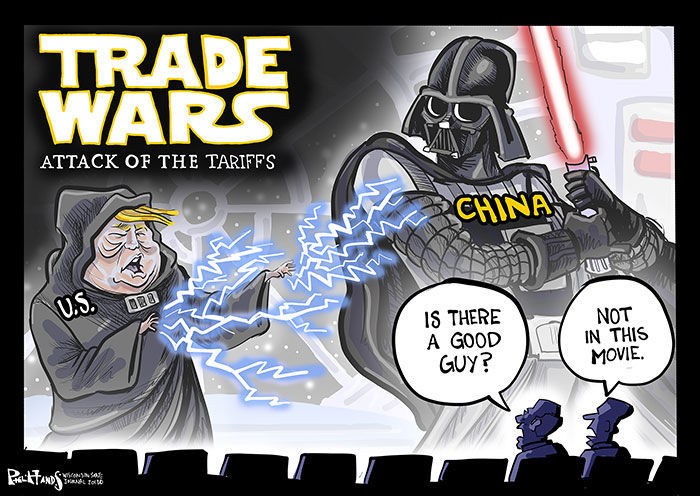In terms of global free trade, many observers of political events have discussed the possibility of a trade war. Recent news articles have discussed the possibility of Trump leaving the World Trade Organisation. Then we also get articles about the possibility of Russia trying to block Britain's membership of the World Trade Organisation post-Brexit. However, from my observation, many people do not understand the historical context of protectionism within the west and why Trumps America is promoting this policy.
Trump's trade policy is not unorthodox in any way. This does not mean I approve of this trade policy at all. For most of the history of the United States, the country has used a protectionist economic policy. The First President of the United States George Washington as early of 1789 used tariffs to protect the homegrown industry and to generate revenue to invest in national infrastructure. In 1789 the Young Republic was an underdeveloped backwater, with a population similar to Ireland at the time. The nation was largely agrarian and there was a lack of unity between the states. Many individual states had their own independent trade policy.
In the late 18th century and the early 19th-century Britain began a process of industrialisation. After the Napoleonic war, the United Kingdom completely dominated global trade and commerce. To protect itself from cheap British products and to promote further economic expansion. (The United States had a rapidly growing population and economy through immigration at large.) The United States successfully protected local domestic firms from overseas competition. The Republican Party and their predecessors that include National Republican Party, Whig Party, and the Free-Soil Party believed in Protectionism over free trade.
The question of protectionism was a key part in the debate between the Democrats and the Republicans alongside the issue with slavery before the American Civil War between 1861 and 1865. The economy of the Southern States was based on exports of goods such as Cotton, Tobacco, and Sugarcane to Europe, this was done predominately by Slave Labour like it has been done long before the declaration of independence on the 4th July 1776. The Southern Slave owners and Democrats in the United States in the period before the Civil War believed that tariffs would lead to the imposition of tariffs on the United States by foreign nations that would render the economies of the deep south uncompetitive. The Economy in the North was based more on heavy industry in states such as Illinois and Pennsylvania where its economies were modelled in a similar way to the United Kingdom. Following the Civil War Republican dominance in politics ensured dominance on protectionist policies despite the pro-free trade policies of some following Democrat presidents such as Woodrow Wilson.
The Great War greatly benefited the American economy. The United States, in the need to fuel their war effort the allied nations imported goods from the United States on mass. The total value of U.S. exports grew from $2.4 billion in 1913 to $6.2 billion in 1917. The continued attacks by the German submarines on American merchant ships exporting to Europe led to American involvement in the in the war in 1917. Woodrow Wilson was not a protectionist, he was both pro-free trade and was a Democrat. Woodrow Wilson was not an isolationist too, he believed in more international intervention and he came up with the idea of creating internationalist organisations to bind nations together such as the League of Nations. Woodrow Wilson created the League of Nations in 1920, however, due to pressure at home the American Congress was against American membership popular opinion in the United States moved towards isolationism and more protectionism.
The Wall Street Crash of 1929 was the greatest stock market crash in the history of the United States. It led to a 12 year long great depression that affected many western economies. In the United States, unemployment peaked at 25% in 1933. In a response to the Great Depression, the United States introduced even more protectionist Policies. One example of this is the Smoot-Hawley Tariff Act of 1930. This intended to protect American businesses and farmers suffering from the Great Depression. In many respects this was counterproductive. Many European countries despite being tied to the United State through war debt from the Great War (The United Kingdom even defaulted on the debt) in introduced protectionist policies both in the response to the United States and the Great Depression.
The move away from protectionism in the United States began after the Second World War. Free Trade was used to bind the Capitalist economies together against the Soviet bloc. After the Second World War, the old European Imperial powers lacked much of their pre-war ability to compete with the economic powerhouse that was the United States of America. This was apparent in the Suez Crisis where President Dwight D. Eisenhower in 1956 where the decaying Imperial powers of France and Britain failed to hold their own against American demands of their withdrawal from Egypt. The United States threatened to sell the US Governments Pound Sterling bonds. This would have significantly weakened the British economy. America was not threatened by foreign competition. The 1946 Anglo-American Loan also tied the United State and Great Britain and its colonies together economically, it prevented drastic hikes in tariffs to prevent and trade conflicts in the future. The Loan was supported by Britain as it enabled the nation to build its Socialist welfare state under the Attlee Government between 1945 and 1950. The United States also was one of the nations in the general agreement of trade in October 1947, which lasted until the creation of the World Trade Organisation in 1995.
The United States was the centre of the Capitalist world. It championed Free Trade between western capitalist nations and encouraged it. American Marshall aid tied European economies together and led to the creation of the European Coal and Steel Community in 1951, this economic union led to the creation of the European Union. It was not until the presidency of Ronald Reagan who changed economics in America into Neo-Liberalism instead of the new deal economics that was championed by Franklin D. Roosevelt. That the United States began to use protectionist economic policies to economies that threatened the United States, even if he championed free trade. Reagan imposed high tariffs on Japanese auto goods. While there was a growth of a strong protectionist wing in the Democrat Party.
In the Post-Cold War America briefly enjoy existence as a sole global economic superpower with one global economic system of American style capitalism across the world. Globalisation was brought American goods and influence on every corner of human civilisation. However, the decline of the United States began instantly after this process. The early 21st century brought about the rise of economies in the far east, this was particularly the case with the rise of China. China until 2016 was the fastest growing economy on Earth, it is now currently the largest economy on Earth. While for decades American manufacturing has gone into rapid decline. The Industrial heartland of the United States is now referred to as the rust belt.
The election of Donald Trump in the United States was a shock to many. His election should not be a shock. Many people felt left behind in the United States and they wanted someone completely different to the political norm, take the example of Pennsylvania for example, it is considered a rust belt state that delivered Republican electoral college votes rather than Democrat ones in previous Presidential elections. The election was also brought about the dreadful campaign by the dreadful candidate Hillary Clinton. That was backed by big business and Wall Street who was the wife of the previous president Bill Clinton. Hillary Clinton was also an extremely corrupt Secretary of State.
Trump's trade policy is not unorthodox in any way. This does not mean I approve of this trade policy at all. For most of the history of the United States, the country has used a protectionist economic policy. The First President of the United States George Washington as early of 1789 used tariffs to protect the homegrown industry and to generate revenue to invest in national infrastructure. In 1789 the Young Republic was an underdeveloped backwater, with a population similar to Ireland at the time. The nation was largely agrarian and there was a lack of unity between the states. Many individual states had their own independent trade policy.
In the late 18th century and the early 19th-century Britain began a process of industrialisation. After the Napoleonic war, the United Kingdom completely dominated global trade and commerce. To protect itself from cheap British products and to promote further economic expansion. (The United States had a rapidly growing population and economy through immigration at large.) The United States successfully protected local domestic firms from overseas competition. The Republican Party and their predecessors that include National Republican Party, Whig Party, and the Free-Soil Party believed in Protectionism over free trade.
 |
| Tariff reform was an important issue in the 1888 Presidental election that resulted in the victory of the Republican candidate Benjamin Harrison |
The question of protectionism was a key part in the debate between the Democrats and the Republicans alongside the issue with slavery before the American Civil War between 1861 and 1865. The economy of the Southern States was based on exports of goods such as Cotton, Tobacco, and Sugarcane to Europe, this was done predominately by Slave Labour like it has been done long before the declaration of independence on the 4th July 1776. The Southern Slave owners and Democrats in the United States in the period before the Civil War believed that tariffs would lead to the imposition of tariffs on the United States by foreign nations that would render the economies of the deep south uncompetitive. The Economy in the North was based more on heavy industry in states such as Illinois and Pennsylvania where its economies were modelled in a similar way to the United Kingdom. Following the Civil War Republican dominance in politics ensured dominance on protectionist policies despite the pro-free trade policies of some following Democrat presidents such as Woodrow Wilson.
 |
| This Canadian poster from 1891 suggests that a policy of tariff retaliation against the United States is needed to protect Canadian Agriculture. |
The Great War greatly benefited the American economy. The United States, in the need to fuel their war effort the allied nations imported goods from the United States on mass. The total value of U.S. exports grew from $2.4 billion in 1913 to $6.2 billion in 1917. The continued attacks by the German submarines on American merchant ships exporting to Europe led to American involvement in the in the war in 1917. Woodrow Wilson was not a protectionist, he was both pro-free trade and was a Democrat. Woodrow Wilson was not an isolationist too, he believed in more international intervention and he came up with the idea of creating internationalist organisations to bind nations together such as the League of Nations. Woodrow Wilson created the League of Nations in 1920, however, due to pressure at home the American Congress was against American membership popular opinion in the United States moved towards isolationism and more protectionism.
The Wall Street Crash of 1929 was the greatest stock market crash in the history of the United States. It led to a 12 year long great depression that affected many western economies. In the United States, unemployment peaked at 25% in 1933. In a response to the Great Depression, the United States introduced even more protectionist Policies. One example of this is the Smoot-Hawley Tariff Act of 1930. This intended to protect American businesses and farmers suffering from the Great Depression. In many respects this was counterproductive. Many European countries despite being tied to the United State through war debt from the Great War (The United Kingdom even defaulted on the debt) in introduced protectionist policies both in the response to the United States and the Great Depression.
 |
| The Smoot-Hawley Tariff was controversial when it was introduced in 1930. Most economists believe that it made the Great Depression worse. |
The move away from protectionism in the United States began after the Second World War. Free Trade was used to bind the Capitalist economies together against the Soviet bloc. After the Second World War, the old European Imperial powers lacked much of their pre-war ability to compete with the economic powerhouse that was the United States of America. This was apparent in the Suez Crisis where President Dwight D. Eisenhower in 1956 where the decaying Imperial powers of France and Britain failed to hold their own against American demands of their withdrawal from Egypt. The United States threatened to sell the US Governments Pound Sterling bonds. This would have significantly weakened the British economy. America was not threatened by foreign competition. The 1946 Anglo-American Loan also tied the United State and Great Britain and its colonies together economically, it prevented drastic hikes in tariffs to prevent and trade conflicts in the future. The Loan was supported by Britain as it enabled the nation to build its Socialist welfare state under the Attlee Government between 1945 and 1950. The United States also was one of the nations in the general agreement of trade in October 1947, which lasted until the creation of the World Trade Organisation in 1995.
The United States was the centre of the Capitalist world. It championed Free Trade between western capitalist nations and encouraged it. American Marshall aid tied European economies together and led to the creation of the European Coal and Steel Community in 1951, this economic union led to the creation of the European Union. It was not until the presidency of Ronald Reagan who changed economics in America into Neo-Liberalism instead of the new deal economics that was championed by Franklin D. Roosevelt. That the United States began to use protectionist economic policies to economies that threatened the United States, even if he championed free trade. Reagan imposed high tariffs on Japanese auto goods. While there was a growth of a strong protectionist wing in the Democrat Party.
 |
| A Czechoslovak propaganda poster against the Marshall Plan. The title is can be translated as The Marshall Plan in Practice. |
The election of Donald Trump in the United States was a shock to many. His election should not be a shock. Many people felt left behind in the United States and they wanted someone completely different to the political norm, take the example of Pennsylvania for example, it is considered a rust belt state that delivered Republican electoral college votes rather than Democrat ones in previous Presidential elections. The election was also brought about the dreadful campaign by the dreadful candidate Hillary Clinton. That was backed by big business and Wall Street who was the wife of the previous president Bill Clinton. Hillary Clinton was also an extremely corrupt Secretary of State.
Trump sees himself as an anti-globalist president. He has imposed tariffs on countless countries in the so-called name for fairer trade. He wants to "Make America Great Again", slow down the inevitable decline of the United States. The three countries/trading blocs he has focused on is tariffs on are Mexico, China and the European Union. Trump believes America has been unfairly hit by free trade, Trump also feels that the United States has been conned by previous Presidents that allowed the rise of the BRIC economies in the expense of the United States. Trump has forced a re-negotiation of NAFTA until a new trade deal. Trump has pulled the United States out of Trans-Pacific Trade Partnership and has considered re-joining if the deal can be re-negotiated. Trump is also keen, to have a Post Brexit trade deal with the United Kingdom.
 |
| This cartoon perfect depiction of the current situation between the United States and China after Trump imposed tariffs on China. |
To conclude this essay, I will briefly discuss what is happening with Trump and his trade policy. Trump like Reagan aims to protect American industries from overseas competition. Trump like him or loathe him aims to restructure the global economic system in favour of the United States, Trump wants a revitalisation of the American Dream and Capitalism. He appears to want protectionism for certain professions that have been in decline in the United States particularly in Manufacturing. He appears to have a Libertarian light vision for the global economy. During his election he flirted with the idea of pulling out of many internationalist organisations, this has not happened. America is not turning Isolationistic. America under Trump appears to be more jingoistic and militaristic. In a way, Trump is trying to mimic Reagan. Reagan supported a Star Wars programme to protect the United States, Trump wants an American space force to enable American domination in space. Overall, I think Trump is only using protectionism as a tool in favour of the United States and his ideological worldview.